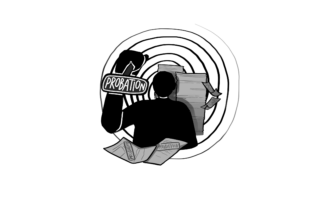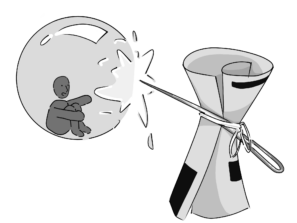We see it everywhere: plastered on bus stations, on buttons and bumper stickers, even in the reddened, bleary eyes of the occasional student. We hear it whispered about among the halls and joked about during passing period. Marijuana has always infiltrated our communities, although some might try to deny it. However, after years of battling a slew of failed marijuana policies, California has placed the long overdue Proposition 19 on the November ballot.
If we zoom into our community at Aragon, this issue hits us especially hard since a significant aspect of the debate over Proposition 19 concerns minors and our increasing familiarity with marijuana. As freshmen, Health class warns them against the evils of marijuana and its life-destroying properties. Ingrained into our minds is the idea of “above the influence” ever since we turned on a television.
However, we should take a step back and examine the proposition more carefully because Proposition 19 will be able to bring numerous benefits that will shed light upon the current woes of California.
One of the most immediate benefits that Proposition 19 will bring is freeing up local courts and police resources that are dedicated to controlling illegal marijuana. A few weeks ago, Governor Schwarzenegger decriminalized the use of marijuana in California, thus lessening the punishment for possession of marijuana to a fine instead of charges that would appear on one’s permanent record. Legalizing marijuana would take the status quo of marijuana laws to a whole new level and save exorbitant cost of upholding the present prohibition of marijuana that drains vital law enforcement funds. With Proposition 19, police and law enforcement would save millions of dollars a year that they could then channel towards solving violent crimes and reducing overcrowding in prisons.
Also, California has over $15 billion worth in illegal marijuana sales every year, and is also home to a $20 billion budget deficit that neither our governor nor our lawmakers have been able to alleviate. We already regulate and tax alcohol and cigarettes, and taxing marijuana is a financially beneficial solution to mitigating California’s debt. The $15 billion that is currently lost in the illegal drug trade would relieve our financial situation and direct funds to employment, education, healthcare, and other public facilities solely by taxing a drug less harmful than alcohol.
Marijuana has gained an infamous reputation as an addictive and dangerous drug. Part of that notoriety stems from facts, part of it from rumor. A main reason of why marijuana can pose physical dangers to the body is because illegal marijuana plantations add harmful pesticides to their crop in order to maximize production. If marijuana is legalized, the new law is likely to induce stricter regulations on growing marijuana, thus solving the risks involved to due to harmful cultivation. Unlike cigarettes and alcohol, marijuana does not cause as much damage to the body because marijuana smokers use it less frequently than do drinkers and tobacco smokers. There is no proven connection between the use of marijuana and psychological disorders either. If both cigarettes and alcohol are legal for adults over the age of 21, criminalizing the safer marijuana makes as little sense logically as it does economically.
Perhaps an economic oversight of the United States government and California in particular, the drug cartels in Mexico are being fueled by our marijuana black market. The ruthless cartels killed 6,290 people in Mexico in 2008 alone, a figure that exceeds the number of U.S. troops who have died in Afghanistan and Iraq since the wars began. Without a need to seek illegal and foreign sellers, marijuana users will cut off the cartels’ revenue, save lives and stimulate the economy.
Although many argue that the number of marijuana users will skyrocket with the consent of legalization, studies in other countries prove otherwise. Portugal’s recent legalization of marijuana has had no detrimental effects. Rather, its marijuana usage rates rank among the lowest in the European Union and rates for use of other more dangerous drugs such as cocaine have remained stable ever since the law came into effect.
California must confront and accept its previous blunders regarding marijuana policy and rise to finally enact the necessary changes to our society. Our current marijuana prohibition policy is beneficial to no one. We must clear the smoke from our eyes and see the clear benefits in marijuana legalization.



I am put off by your by lack of “true” knowledge of marijuana and it’s effects. I had worked in the Drug and Alcoholic services for many years and have worked closely with addiction and it’s effects, your portrayal of marijuana as non addictive and harmless drug greatly disturbs me. Trying to validate your bias position through a school publication without “actual facts” is irresponsible and I find it in very bad taste.